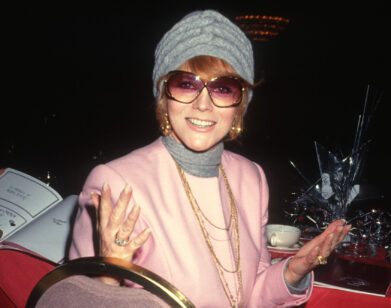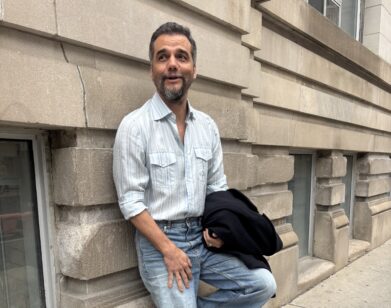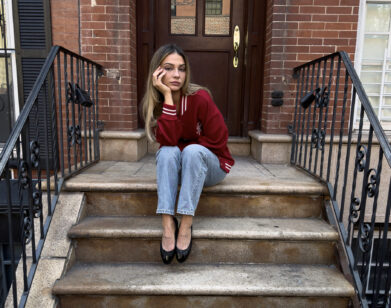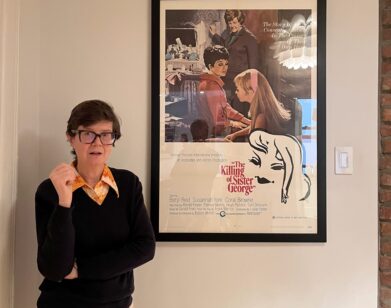The Prodigy: Saoirse Ronan
I remember very vividly how it felt to be a child on a film set, and that is actually really important to hold on to for as long as you continue to make films. You need to be childlike, don’t you? Saoirse Ronan
When she emerges almost without warning from a snowbound wood as the semi-feral warrior namesake of 2011’s Hanna, Saoirse Ronan completely overwhelmed the world and her antagonists (including an evil spy played by Cate Blanchett) with an easy balance of almost preternatural talent and rigorously drilled skills. Same for the actress who, a few years earlier, at the ripe old age of 12, was cast in her major film debut in director Joe Wright‘s sweeping 2007 adaptation of the Ian McEwan novel Atonement—and picked up an Oscar nomination for her troubles. In the nearly nine years since her first film, all Ronan has done is work with Peter Weir (The Way Back, 2010), with Peter Jackson, on the 2009 adaptation of Alice Sebold’s monumental best-seller The Lovely Bones, with Neil Jordan (Byzantium, 2012), and with Wes Anderson, playing the doomed baker-outlaw-romantic Agatha in 2014’s The Grand Budapest Hotel.
In 2015, the New York-born, Ireland-raised Ronan drew on her dual roots to play an Irish immigrant in New York in the 1950s, in the lauded romantic drama Brooklyn, and secured her second nomination from the Academy. This February, as she wound down campaign season and geared up for her part in the Broadway production of Arthur Miller’s The Crucible, Ronan, now 21, talked to an actress and director who knows from the Oscars-two-time-winner Jodie Foster.
(Continued from Jodie Foster)
JODIE FOSTER: Do you live with your parents at home?
SAOIRSE RONAN: I moved away to London when I was 19, actually about six months before we made Brooklyn. So by the time we made the film, I was still incredibly homesick. I don’t know if you found it this way when you were young, but to move away is very different from just working away from home. It was something that I needed and I wanted to do. I wanted to leave Ireland and have anonymity while I was young so I could be stupid and relaxed, I suppose. So I lived on my own and got used to paying bills every month and washing dishes and not leaving them in the sink for five days. New York was always the end goal for me. It was always inevitable that I’d move here because I’d had such a strong connection with it from a very young age. I guess because I know I have roots here, and the energy is really palpable. As soon as you land, you feel like invigorated or something. I feel like it’s a good place to be when you’re young.
FOSTER: I’ve always felt much more lonely in Los Angeles than I’ve ever felt in New York. Maybe it’s because you have these connections where you’re always kind of bumping into people on the street and running into people or hearing someone order something in the café next to you. Whereas in Los Angeles, you can go for days and days and days and barely ever contact anyone.
RONAN: Growing up in this industry, have you seen L.A. change at all?
FOSTER: Oh yeah. I grew up here as a child, but it is a much richer city than it ever used to be. It had a different feeling to it. It was more about our Latin population, at least where I lived. I grew up in Hollywood. My mom was really into every different kind of food—Filipino food, Indian food, Thai food. It was really diverse. It doesn’t feel that way anymore. I have a place in New York and I have a place here, but growing up in Los Angeles, I always felt like I was different because people didn’t talk here. If they had a problem, they just kind of went to the beach or played sports or something. There was no sitting inside a café or a library on a rainy day discussing the world and relationships and all of those things that I grew to find on the East Coast.
RONAN: I’m sure you know Emma Thompson, who is so bloody brilliant—she said to me, “If your job is to play real people, then you need to be surrounded by real people in your everyday life.”
FOSTER: People lose touch with that as the years go on. I remember when I was young, like 17 or so, the first time I did anything without my mom. I’d never made movies without my mom, and she made a point to stay behind, and it was tough for me. We’d been a little team; we did our laundry on the weekends. And then, around 18 or 19, when I said, “No, I have to do this on my own,” I really hit a bad patch. I didn’t know what to do with myself. I didn’t know how to be on my own. I was a little scared to go to my room by myself. I can’t just come home from work and not eat anything. So how was I going to go have dinner all by myself? So I learned as the years went on. I learned how to cook and keep myself occupied so it felt like I was home. I brought my own sheets because it felt like home. I would find the person on the crew who was the most trouble, and I would hang out with them. Like, “Who’s in the bar? I want to go hang out with everybody in the bar!” [laughs] Then, over the years, I learned to get little apartments. I’d have my pots and pans, and I made my soups. And somehow that was a way for me to stay well-adjusted when I was on location, instead of going a little mad. But it took me a long time.
RONAN: Home-cooked food, that totally represents home, doesn’t it? I did the same thing when I moved to London. I learned how to make the dishes that my mom and dad would make at home—chicken and vegetables, or spaghetti Bolognese, basic enough stuff. But the fact that I was cooking, or just the smell of food in the place that you live in, it made me relax a bit more. Even just having the TV on in the background so you feel like you’re less alone.
FOSTER: Exactly.
RONAN: Is that so sad? [laughs]
FOSTER: When I was younger, I was really worried about whether I was going to be good or not. That’s why, if someone said that I could be 20 again, I would turn them down. I was so filled with anxiety about, like, “Is anyone going to like me?” And as the years went on, the anxiety started to leave. I was expending useless energy, worrying. And I became more and more well-adjusted. I guess it was just about getting used to it, being away from my mom.
RONAN: I’m really close to my mom as well, and she came away with me up until I was 19. I’m a baby, as everyone knows now, since I just said it in an interview. But she always comes over for the first week to help me settle in. It’s really important. But today I felt the way you did. When I was a kid, it felt—not in a big-headed way—but it felt like it was so easy. And the older I got, the more insecurities start to take hold of you. I felt exactly the same way as you; that I’m going to forget how to do this. I won’t be able to do it as easily as when I was younger.
FOSTER: Well, you have a lot of people paying attention, too. That’s the beauty. Wow, you’re nominated for an Oscar; that’s amazing! But with that comes all the scrutiny and the pressure from yourself, thinking, “Did I deserve this?”
RONAN: That’s the worst thing for me. I’m a huge worrier as well. The thing that I would worry about after being nominated again is, “How do I keep that up?” Not in relation to awards, but keeping up performances.
FOSTER: Well, the good news about getting older, as well, is that when you’re young, everybody keeps telling you that you can do anything and be anything, so there’s all this pressure: “Oh, I guess I could sing and have an album. I could be in the Olympics. I could do a romantic comedy. I could be the queen of the red carpet.” And then, as you get older, you realize, “I’m not very good at sports. I’m not going to be in the Olympics.” You start checking things off and understanding who you are and who you’re not. Somehow that’s very comforting. You realize you don’t have to compete in areas that are of no interest to you.
To move away is very different from just working away from home. It was something that I needed and I wanted to do. I wanted to leave Ireland and have anonymity while I was young so I could be stupid and relaxed, I suppose. Saoirse Ronan
RONAN: Did you feel competitive when you were younger?
FOSTER: I wasn’t competitive. My mom was, and I would have to tell her to get it away from me. Like an athlete’s manager, she would try to bring it in to the equation. And I was very careful about saying I didn’t want to hear it. I’m sure there are people in your age bracket constantly comparing your career to theirs. And if you’re like me or like anybody who’s slightly insecure, you’re thinking, “Wait a minute, should I have done that? Or should I have done this?” There are so many choices, and the choices feel like life or death choices. When I was probably your age, it was the time of the Brat Pack, all those John Hughes movies. They were great movies. But I didn’t want to do that stuff. I was in college, and all those kids were friends with each other. They were all in Los Angeles. I knew them. And they were great, and great fun. But it was like, “What’s wrong with you? Why aren’t you in The Breakfast Club? Why aren’t you in all the John Hughes movies?” It was kind of hard. Because I guess I was worried that I wasn’t at the right place at the right time, and yet every instinct I had told me that it wasn’t the place I should be. You learn as you get older to tune those voices out and to know yourself better, to know that if it feels right and instinctive to you, and then you’re in the right place. Is there anybody who has given you great advice?
RONAN: Well, everything that you’re saying has been pretty great, I have to say. My mom has always been so wonderful and she’s always said to me exactly what you said: to always trust your instincts. And whether it’s about a script or whether to live in this city or live in that city, if you’re questioning it, maybe it’s not quite right for you. Even the way I work is very instinctive. It’s always been based off of instinct. Anytime it feels like it’s not, then it feels wrong to me. And after I did Atonement, I was playing a character and trying to figure out how to make it work. I told my mom that I was still very sad from Atonement and not being a part of that experience anymore. I said to her, “I don’t really have that much to say.” And she said, “You know, you don’t have to tell a story through words, you can always tell a story with just your face and your eyes.” I think it was from that moment that my eyes became a huge part of how I would communicate on-screen. So the best life advice and the best professional advice have been from one woman. [laughs]
FOSTER: Me, too. It really was a sentimental education, you know? I made movies with somebody. And the guidance came from love; it came from love and genuine interest in, not just my success, but in my well-being, long-term.
RONAN: And doesn’t that give you such a great perspective as well?
FOSTER: Yeah, it really does. There were things that she was wrong about, that we disagreed about—and that was a difficult and wonderful time, when I realized that my mom was wrong about things. But I guess the overriding thing is that she always felt like there was an ethical component to all of the choices that we make. The choices we make in our career, in business, in the character are to be as good a person as you can. And that translates to how you treat people, how you treat the actors and the technicians you work with, how you collaborate with people, and how you encourage and inspire other people to be creative. Or how you are a gentleman in business life. When you shake someone’s hand and say, “I will do this,” or “Yes, I will be there at eight o’clock in the morning.” Then you show up. That whole, like, “You are the person you are at work”; that’s a reflection of who you are. I feel like that really came from my mom. And it’s been a real guiding light for me.
RONAN: Thank God for our mothers.
FOSTER: [laughs] Yeah. And with my kids, I hope that somehow I can be a part of their process in their life. My son now is 17, and he’s very busy telling me that I don’t know what I’m talking about and trying to become independent. He’s looking at colleges, and he’s driving cars, and he’s got a girlfriend. And I’m really enjoying it. I’m enjoying watching someone crave independence. But I’m always watching him sadly. Every once in a while, he’s got to fail. I told him a million times to put his car keys in the dish, and if he doesn’t do it, he’s going to lose the car keys. And if he has to be somewhere, he’s going to say, “Where are my keys?” So part of allowing him to be independent and find his own way is also watching him fail. Which is hard for me. Of course, all I want to do is chop the wood for him, and say, “Here, this is how you make a fire!” I’m sure you run into this question all the time, because people ask me this all the time. There is a body of child actors who ended up being not very well-adjusted, who find themselves in jail or not doing very well in their lives. And people say, “Well, what do you think of that?” I say, “There are many child actors that you’ll never hear of because they’re now real estate brokers or business managers.” But it is true, I guess, that the sidewalks are littered with young kids who weren’t able to find their way. And I really do feel like some of that is—and tell me your opinion—but some of that is who you are, who you’re born to be. And the other half is, I feel, mom.
RONAN: Totally. We put so much focus on child actors and younger celebrities. But there are so many people I know who, because of their relationship with their parents—especially a guy with his mother—it will either make or break you. Your mother especially. There is something about actually coming from her, having that chemical connection to this woman. It really does shape you. I’m sure you’ve heard of Frank McCourt, who wrote Angela’s Ashes.
FOSTER: Of course.
RONAN: Malachy was his younger brother. I heard a story that when Malachy was about 6 years old, Angela came in to the house and he said, “I love you, Mommy.” She looked at him and said, “What did you just say to me?” He said, “I love you, Mommy.” Angela’s friend came in, and Angela turned to her friend and said, “You’ll never guess what he just started saying to me. He just told me he loves me. Fucking idiot.” And from that point on, Malachy couldn’t tell anyone that he loved them. She probably didn’t even think about it. And that would have happened to a lot of kids around that time, to be told that he was silly or stupid, or to feel degraded for expressing himself so that he never did that again. That struck me. Some people don’t realize the huge responsibility you take on when you’re a parent. I say that just from being so close to my mom. She’s the one who has kept me sane. And she continues to do that. She’s always the one I go to when I feel lost or I feel as though I’m about to fall apart, or I’m excited about something, and I want to share it with someone. She’s just everything. And not only because she’s a wonderful person, but your parent is your first leader. Essentially, they’re your first director. They’re the first person you turn to, to know which is right and which is wrong.
FOSTER: That’s right. I always equate parenting to directing. You’re doing two things: You’re telling your child or the person that you’re working with that they can do anything—you’re saying, “Go, go, go.” You’re a cheerleader. But the other half of it is, “You need to be on the train at 8:29. The train leaves the station at 8:29, and I need you to get to Penn Station at 8:22.” The children need love and freedom, and they need to know that whatever they do is okay, that you’ll love them, and you won’t humiliate them or make them feel small or anything for something that they try. But they also need to know that there’s some major structure and that somebody is in charge who is going to look over them and make sure that they fall under the lines of telling the right story. That they’re not just flailing on their own.
RONAN: I know, because that’s what creative people do. Whether you’re an actor or a writer or a director or an artist or a singer, if you’re passionate about what you do, it can kind of be endless when you’re in the right environment. And it’s up to the director to manage that and help it to flourish. It’s great to hear you saying that. I’ve never directed—I’d love to—but I like having rules to follow, whether in my personal life or in work. I think that, within that, there’s so much freedom, because you know where you need to go, you know where you need to end up. And you can map it out in the middle. And it’s great when a director, like a parent, makes you feel safe and loved. Because at the end of the day, an actor is an insecure being and needs someone to go, “You’re doing great.”
For more from the Queens of Cool, click here.







